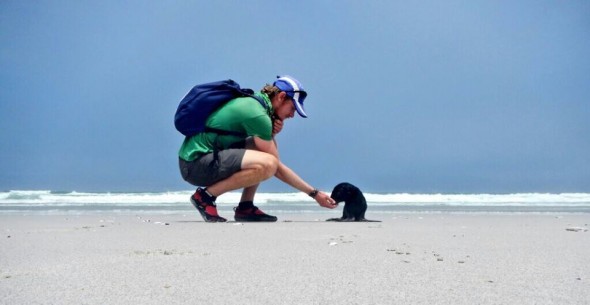
Six Million Cheers for Grant Christie!
Congratulations to Grant Christie who has just completed his Six Million Steps expedition, walking the ENTIRE length of the South African coastline solo and unaided. “It is done. 250 days. 3 513.6 km. 5 300 326 steps. I feel no different than any other day. It will probably take a while to sink in,” Grant wrote on […]

Congratulations to Grant Christie who has just completed his Six Million Steps expedition, walking the ENTIRE length of the South African coastline solo and unaided.
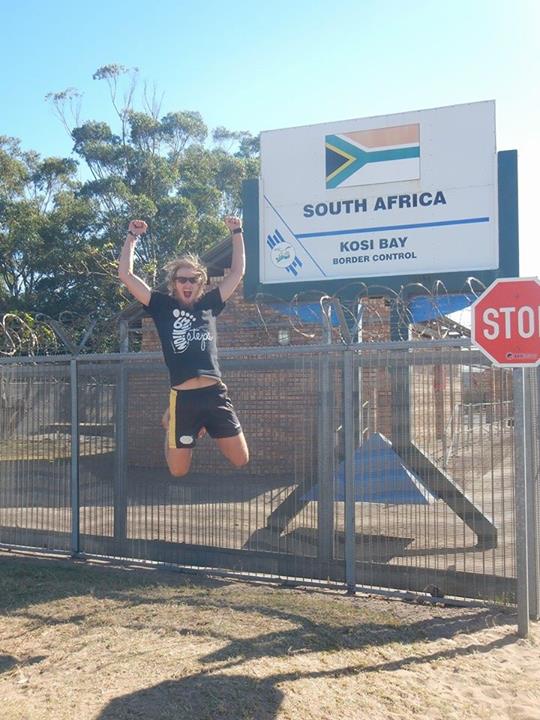
“It is done. 250 days. 3 513.6 km. 5 300 326 steps. I feel no different than any other day. It will probably take a while to sink in,” Grant wrote on Facebook a couple of hours ago.
“It is too great an adventure to take in in one moment. But if I were to describe it in one word: EPIC. The future is uncertain, but one thing I know for sure is that my body is going to enjoy some rest.
“To everyone that has followed, supported and encouraged; everyone I met along the way; everyone that helped, homed and fed me… your contributions helped more and mean more to me than I could express in a few words. Thank you for sharing in this journey with me.”
Grant’s 3,000 km journey began on the 17th October 2013 from Alexander Bay on the West coast and finished today in Kozi Bay on the KwaZulu-Natal north coast, with many adventures and agony in between.
At one point both his feet were bandaged, and the trip that should’ve taken seven months took just over eight. He carried all his equipment and supplies on his back.
Grant was inspired by a childhood love of nature and “driven by a distinct dissatisfaction with ordinary living”.
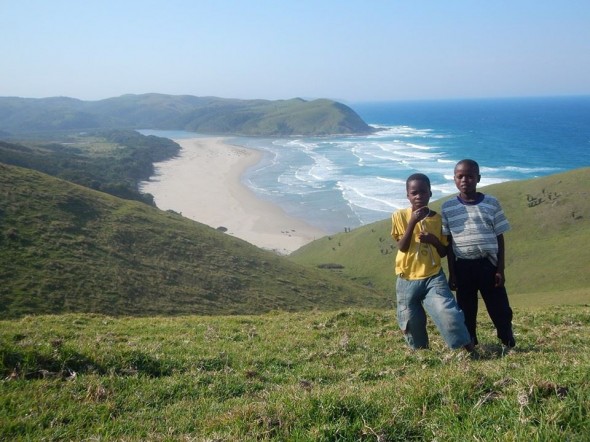
The walk was endorsed by the Wilderness Foundation South Africa, with the purpose of the journey being to uncover the environmental burdens on the coastline and to raise awareness of these issues.
According to the Six Millions Steps facebook page, the project will also “raise awareness specifically for two of the Wilderness Foundation’s programmes, namely the Forever Wild – Great White Shark Conservation Initiative, which focusses on the Great White Shark as a charismatic keystone species and a symbol of ocean wilderness; and the Pride Project, which is a youth-oriented experiential education programme run predominantly in coastal provinces.”
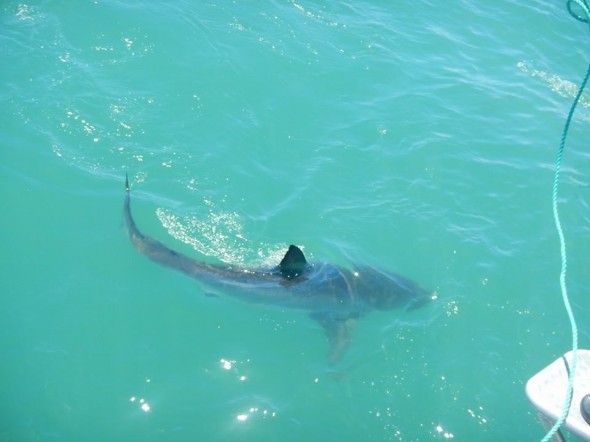
The name Six Million Steps came from a rough estimation predicting half-metre stride lengths: 2 steps per metre = 2000 steps per kilometre = 6 000 000 steps over 3,000 km. In the end Grant walked a total of 3,513.6 km which was 5 300 326 steps!
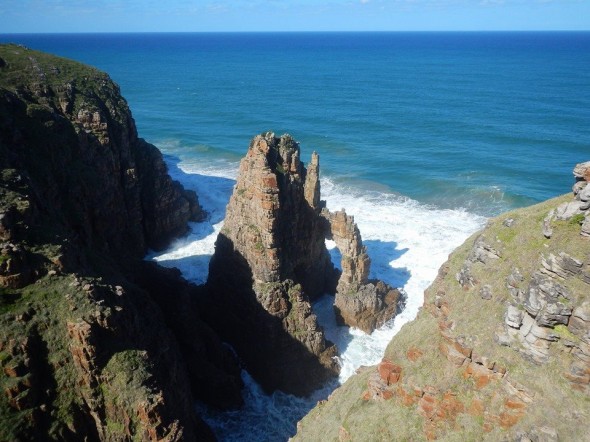
Grant’s Facebook page highlights that “human activity is a grave threat to our oceans and coastline” and that with everyone’s support “Six Million Steps can become a powerful stepping stone in the preservation of our precious coastal wilderness”. As a start, here is one of Grant’s posts from Facebook in November 2013 (grab the tissues):
Samuel, 26 November 2013 – written by Grant Christie:
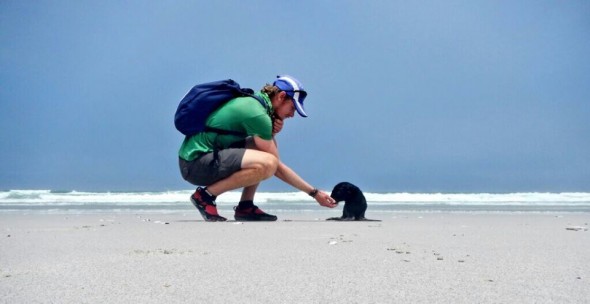
As I approached she strained to lift herself up onto her flippers and hustled down towards the ocean. But unlike all the others she didn’t glide into the waves. She stopped, turned and looked back. Desperately she called to her tiny pup, imploring him to follow her to the safety of the water. Blind and bewildered he bleated back, but he didn’t budge.
Perhaps he thought I was his mother as I knelt down beside him.
But she was watching anxiously from amongst the waves.
Samuel I called him.
With tears rolling down my face I walked away, looking back every now and then to see if his mother had returned to his side. After a few hundred metres, overcome with emotion, I fell to my knees and wept.
This little chap, mere days old, didn’t stand a chance. And there was nothing his mother could do to help. Weak and underfed herself, she can’t produce milk to sustain him. If mom starves, baby starves.
A few days ago in Lamberts Bay I told Yves the story of the cute little seal that seemed to wave at me all those weeks back near Kleinzee.
“Do you know what anthropomorphism is?” he asked.
Yves is the Lamberts Bay Bird Island conservationist. The island is home to a Cape Gannet breeding colony, one of only three on the Southern African coastline.
“A seal on the beach is a sick seal.” he said.
“I thought they were just chilling on the beach, warming up in the sun.” I said, revealing my naivety.
“They are. But it’s because they’re malnourished. They don’t have enough energy to keep swimming, and they don’t have enough blubber to regulate their body temperature in the cold water. There just aren’t enough fish to sustain the colonies.”
“They’re in pain!” The anguish in his voice tangible.
Suddenly the Slumbering Seal Surprise wasn’t so funny anymore.
With my heart heavier than my rucksack I picked myself up and leaned into the stiff South-Wester. As the blistering wind whipped sand across my legs I trudged past corpse after rotting corpse. Each one a graphic reminder of the cruel fate awaiting the little pup. Periodically I lashed out with my trekking poles, taking my emotions out on the plastic bottles discarded by tacky human beings.
After that I felt terrible everytime I disturbed a seal. They’d use what little energy they had left to dash back into the icy water. Some of them didn’t have enough strength. They had just about enough life left to open their eyes as I walked by.
Four days ago I counted 86 dead seals in just four kilometres before Lamberts Bay. Using that as a representative figure – over the last four days between Doringbaai and Draaihoek I have walked past over 2 000 carcasses at varying degrees of decay.
The problem is not seal die-offs. There are enough seals (for now?).
The concern is that it is a symptom of a far greater problem. Fish stocks are being depleted at rapid rates. And yet recreational fisherman with sports licenses are up in arms because of the reduced crayfish season. Seals (and people) who depend on fish for their very lives are starving, and we complain because we can’t have some fun this weekend and braai some kreef.
But what do we do about it?
What can we do about it?*
A Sacred Ibis picked at the bones. Every time I got close it would fly ahead to the next carcass. Taunting me. Reminding me.
Not even the howling wind could drown out Samuel’s desperate cries, now forever etched in my mind.
Ten kilometres further on a pup of Samuel’s age lay motionless. The crows had already pecked out his eyes, his dignity, his very soul.
The sight brought another flood of tears.
“Jy is seker dors?” Marietjie asked when I arrived at Draaihoek some five hours after meeting Samuel.
“Ek is hartseer.” I replied.
Yesterday the sea and sweat left my face caked in salt.
Today my cheeks were seasoned by tears.
I didn’t stop to rest or shake sand out of my shoes.
I didn’t eat or drink.
I didn’t sing.
Today I mourned.
By the time I had taken my last step for the day, Samuel had probably taken his last breath.
RIP little Samuel.
You will always be remembered.
*What can we do about it?
Be a responsible consumer:
Check the SASSI list and only eat fish on the green list. (SMS the name of the fish to 079 499 8795 to check)
Goodbye tuna mayonaise sandwich… Most tuna species are overexploited.
Don’t buy “cheap” crayfish. It was probably caught illegaly.
Don’t waste food.
Be a responsible fisherman:
Don’t exceed your quota.
Don’t fish outside of permitted times. I don’t care if your papa and oupa have been doing it for decades!
Report illegal fishing and poaching.
Please see Six Million Steps’ FB page for more photos and info:
www.facebook.com/sixmillionsteps
“Making a difference one step at a time. What’s your next step?”
– Six Million Steps
